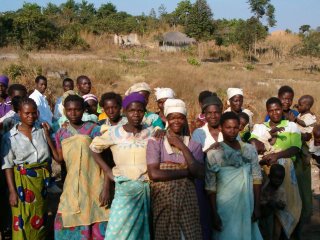Part Four: August 5
The last four days in Malawi are quiet enough. I spend most of my time catching up on writing up on all the people I’ve met so far and get two more good interviews with Rexa from Cadecom on food security and John from Malawi Health Equity Network. Sadly visits to Likulezi and other partner interviews have not come together for various reasons. I spend Wednesday morning tearing around Lilongwe trying to get enough Kwacha together to pay my bill and packing up. The receptionist at Nelly’s is peeved at Niall for telling me about the good rate he got paying in dollars and won’t extend the deal to me! We leave for Zimbabwe in the afternoon. I am apprehensive I must admit.
We arrive in Harare’s pristine and almost empty airport late on Wednesday evening. The Air tower looks like a Mosque and President Mugabe’s portrait looms out from all quarters. Niall has two splendidly christened regular Taxi drivers for his visits to Harare; the Professor and Rhodesia. Rhodesia had three cars all in fine condition when Niall met him first, four years ago. Now Rhodesia and the Professor both drive absolute bangers. Neither car has seatbelts in the back, most worryingly, you can hear both cars creaking and rattling along the road. Rhodesia’s has to be kick-started with a push each time after which it jerks violently back and forth for a few seconds before taking off. A slew of Taxi drivers wait outside the Bronte Hotel where we are staying, desperate for business. All my interviews over the next two days are within fifteen minutes walking distance of the hotel and I disappoint the Taxi men each time I leave the building, walking out into Harare’s New York like grid of wide streets, with high rise apartment blocks and commercial buildings. You can tell that Harare was clearly not a bad place to live once upon a time.
Zimbabwe’s Taxi drivers are an obvious metaphor for the cataclysmic political, social and economic decline of this country over the last six years which has been well documented on the Trócaire website I work on. So I am already sufficiently spooked about being here before I’ve even met with any of our partners or been harassed by the police. In the morning, walking the streets of Harare, the Army are a very visible presence. In a fifteen-minute walk, I count over fifteen soldiers: “Not good” as Niall is prone to say.
The currency change is the talk of the town here. The Zimbabwe government has issued a new currency which has three less noughts but its value remains the same. The old currency is to be phased out from August 21 and Zimbabwe citizens have been told it is illegal to keep over $100 million (€100) on their person. This has given the Zimbabwe state yet another excuse to harass, intimidate and humiliate its citizens. Roadblocks are being set up all over the country to search people for the old currency. The currency has also been devalued by 60 percent. Inflation here last month was 110 percent, and in the last year, over 1200 percent. On payday, people queue at the cash machines to spend their money immediately before it loses all its value.



<< Home